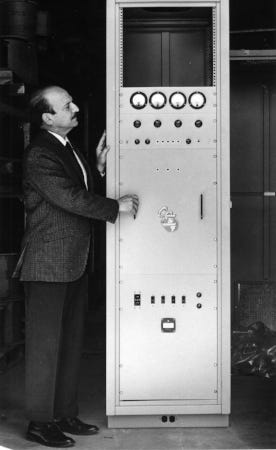Wealthtender is a trusted, independent financial directory and educational resource governed by our strict Editorial Policy, Integrity Standards, and Terms of Use. While we receive compensation from featured professionals (a natural conflict of interest), we always operate with integrity and transparency to earn your trust. Wealthtender is not a client of these providers. ➡️ Find a Local Advisor | 🎯 Find a Specialist Advisor

We all learn our money habits from someone. Having a role model early in life–someone who knows how to take care of their money but doesn’t let the practice consume them–can make the difference between a lifetime of great money habits and a long series of financial mishaps.
I was lucky. My money hero was a hardworking, thrifty, sharp-witted survivor and all-around decent human being: My dad.
I benefit every day from the example of a hardworking, thrifty, sharp-witted survivor and all-around decent human being: My dad.
He was no millionaire, not by a long shot. Yet, he was a towering hero to me, for a lot of reasons, including that he knew the value of a buck. His name was J.J. Wormser.
A gifted electrical engineer and inventor, J.J. worked for a Who’s Who of cutting edge technology companies of the time: Bell Labs, Continental Electronics, Southwest Research Institute.
If the Internet existed and the electronics companies of the 50s and 60s had been as good at hyping themselves as the dot.coms are, he would have had a ribbon of Google hits as long as this.

As it was, he was just my dad. But, Google him: still pretty good for an old guy.

Money Wisdom in Shoe Boxes
A work-for-hire guy in a pre-intrapreneur world, J.J. had to surrender all his patents to the big boys who employed him. A product of the G.I. Bill and youngest son of a ranching family, he elbowed his way into the then-new field of electrical engineering with only a high school diploma and an incurable love of tinkering with radios (later TVs). In other words, J.J. earned a place among the holy brethren of pre-digital geeks through sheer force of will.
He was also great with money, doing his own taxes year after year, hoarding every receipt in shoe boxes. The boxes came down from the shelf of his closet ceremonially every January, and were neatly filed in the attic on April 16. Along with my mom (who had to put herself through nursing school) my dad put the three of us through college all the way because by God what happened to them would not happen to us. (And of course, the hot mess of college inflation had not yet happened to any of us).
J.J. used to dream aloud on long car rides about crazy inventions for everyday problems, and how he’d make all of us rich. He painted oil landscapes in the garage, with only his mind for a view; studied sculpture and drove a VW bug, and only sold his beloved motorboat when my mom finally made him. He loved to snap open his menu in restaurants and say to the whole assembled family, “Order whatever you want.”
In the couple of years before he died in 1997, widowed and insomniac, J.J. wrote us long emails about his will, his safety deposit box, and what he would do with the money if he won the lottery tomorrow. It was always about us.
In the couple of years before he died in 1997, widowed and insomniac, J.J. wrote us long emails about his will, his safety deposit box, and what he would do with the money if he won the lottery tomorrow. It was always about us.
But I digress.
Standing Up When the Chips Were Down
In 1972, at age 50 he did something he’d never done: He left the Company. Lay-offs were afoot and he wanted to leave as his own man, get a better job, maybe even start his own company. The kids were sixteen, fifteen, and nine (me). Oh, and, yeah: there was a recession on its way.
So here was my dad’s great new job: floor salesman at Levitz Furniture. My shy, wise-cracking, self-taught, Melville- and Conrad-reading father was set loose in a piranha tank filled with other desperate, underemployed, middle-aged men with kids to feed. He did it 6 and often 7 days a week every week for the 10 longest months of his life. There was no menu-snapping in those months.
Thing is, he showed up. Every day. And when he got a solid job offer, way below market, he jumped at it and got to be an engineer again for another decade and a half.

Heroes Are the Ones Who Show Up. Including You.
We’re not all so lucky. Some of us have to find our money heroes late in life–and sometimes, the hero has to be us. Writing about his tortured relationship to an inheritance from a father who died too young, writer Alexander Chee has said, “I have tried to change my relationship to money and pain, which are forever twinned in my mind.” That can be hard if you don’t know who your role models are; if you yourself might have to learn as you go.
Even though I was lucky enough to have my father in my life for a long time, I can relate to the idea that money and loss are somehow bound up. For that reason, it’s all the more important to surround yourself with role models who not only teach good money habits, but teach a healthy relationship to money. My father was good at this. He believed that money could make a life fundamentally better, often more joyous, certainly more stable. At the same time, I learned from him that money was only a tool. It was never the goal of one’s life.
Chee had to forge his own path back to a healthy relationship with money, and with his life, as he explains in his book How To Write an Autobiographical Novel.
Showing up is what I am thinking about today. Where money and love (lack of one and consequences of the other) are concerned, the people who show up are the heroes.
Do you have a financial hero? Could that hero be you? Drop me a line and tell your story. Meanwhile, here’s some car-buying advice from my dad, via the blog Dead Housekeeping.
Car-Buying Advice from My Dad
Never buy a new car.
Never buy a car from a dealer.
Buy directly from another owner, and have your own mechanic check it out.
Try to buy for cash, or put at least half down. A car loan is the worst loan to have.
To find your car, comb the paper all week for several weeks.
Don’t rush.
Seek patterns: The people who took out an ad every single day of the week bought the package deal the newspaper offered, and so they know good value.
They do not cut corners.
They are poundwise instead of pennywise.
They probably cared for their car, and probably know how to negotiate.
Never enter into agreements with anyone who does not value what they offer.
Do not begin with a dream in mind.
Read first, see what’s out there, see which cars have the lowest mileage for the best price, consult the Blue Book, consult Kelly’s.
Let the dream car find you.
Want to surround yourself with great role models? Choose your friends wisely, says Elizabeth Blessing.
Wealthtender is a trusted, independent financial directory and educational resource governed by our strict Editorial Policy, Integrity Standards, and Terms of Use. While we receive compensation from featured professionals (a natural conflict of interest), we always operate with integrity and transparency to earn your trust. Wealthtender is not a client of these providers. ➡️ Find a Local Advisor | 🎯 Find a Specialist Advisor

